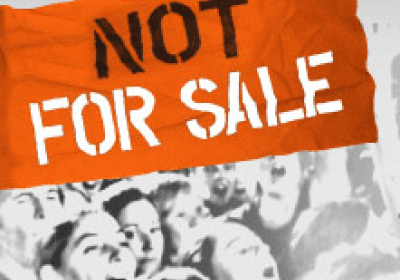Eighty people attended a Unions NSW public forum, “NSW Not For Sale” on September 22. The forum examined the social impact of the sell-offs of NSW assets and services, the state of the campaign against privatisation, and the best way forward in the run-up to the March 2011 state election.
The June state council of the NSW Teachers Federation called for the forum, hoping it would lead to meetings of public sector union delegates to relaunch the fight against the bipartisan sell-off and downsizing of the NSW public sector.
Dick Nichols
The National Tertiary Education Union is undergoing a leadership renewal that will strengthen its progressive role on industrial and educational issues. The process will also help the NTEU on the social and environmental fronts on which it is showing leadership.
Matthew McGowan, the former secretary of the union's Victorian division, has been elected as the union's new national assistant secretary. When McGowan headed the union’s Victorian division it succeeded in repelling serious attacks on staffing and educational standards at Victoria University and the University of Ballarat.
The Socialist Alliance national office has produced its analysis of the August 21 federal election. It traces the precise mix by electorate of the increased Green, Coalition, independent and informal vote, produced as voters deserted Labor.
The differences among the seat-by-seat contests in an Australian federal election have never been so great. The general disillusionment with the two major parties expressed itself in quite different ways in different electorates and areas.
On September 1, Luke Foley, the newest Labor member of the New South Wales Legislative Council, rose to make his inaugural speech to the chamber.
Foley began: “It is with pride and humility that I enter this place, Australia’s oldest Parliament, as a representative of Australia’s oldest, and greatest, political party — the Australian Labor Party.”
Oh dear. What a day for Foley to praise the ALP in NSW.
Up to 1.5 million people flooded the streets of Barcelona on July 10 in an enormous demonstration behind a lead banner proclaiming: “We are a nation, we decide.” The turnout exceeded the most optimistic forecasts.
Even the most conservative and Spanish-nationalist media admitted this huge protest against the constitutional court’s undermining of Catalonia’s Statute of Autonomy was one of the biggest since the end of the Franco dictatorship in 1975 — and the most important in the history of Catalan nationalism.
Thousands rallied around Australia in support of Ark Tribe, a construction worker facing jail for simply failing to attend an interrogation by the construction industry police — the Australian Building and Construction Commission (ABCC).
Workers held an overnight vigil outside the ABCC offices in Melbourne, 500 rallied and marched in Sydney and up to 1500 rallied outside the Adelaide Magistrate's court where Tribe is on trial. Trade unionists from around the country travelled to Adelaide to show their solidarity.
One sentence in the final declaration of the Search Foundation’s Left Renewal Conference (From Global Crisis to Green Future) captured the key issue: “Capitalism has been unable to address inequality, war and ecological degradation, and must be replaced by a democratic system that puts human need before greed, and socialises wealth instead of debt.”
The movement for Australian union action against Israel is gaining strength after the apartheid state’s latest murderous attack on the unarmed aid flotilla to Gaza.
The South Coast Labour Council (SCLC) and the New South Wales and Australian Capital Territory branches of the Australian Services Union have joined the Construction Forestry Mining Energy Union in committing to the international boycott, divestment and sanctions (BDS) campaign against the aggressive Israeli state.
Australian unions and peak bodies have also called on members to attend the many protest actions.
An angry Prime Minister Kevin Rudd told the May 12 7:30 Report that he was “passionate about acting on climate change”. Yes, we know. But if only he’d stop acting and start doing.
The demise of the Rudd Labor government’s proposed Carbon Pollution Reduction Scheme (CPRS) is not the problem. It’s a good thing. The problem is that the government still has no serious climate change policy.
It took the Rudd government some time to work out how best to exploit the final report of Australia’s Future Tax System Review, led by Treasury Secretary Ken Henry. Which of its 138 recommendations to implement straight away, which to reject, which to stick in the too-hard basket?
The Henry Review aims to develop the best possible tax-and-transfer policy for Australian big capital. But there are other proposals that would make up a tax-and-transfer policy for the working-class majority.
The Rudd government has already ruled out action on 27 of the Henry review’s 138 recommendations.
In protests around the country on Workers Memorial Day, April 28, thousands of workers came out to remember those killed on the job and to protest against the Australian Building and Construction Commission (ABCC).
Speakers pointed out that since the ABCC was formed, deaths in the construction industry had risen from 3.14 deaths per 100,000 workers in 2004, to 4.27 in 2008. The rate peaked in 2006, at 5.6.
The Rudd government’s home insulation program, under which four workers died and there have been 120 house fires, also came under attack.
- Previous page
- Page 24
- Next page








